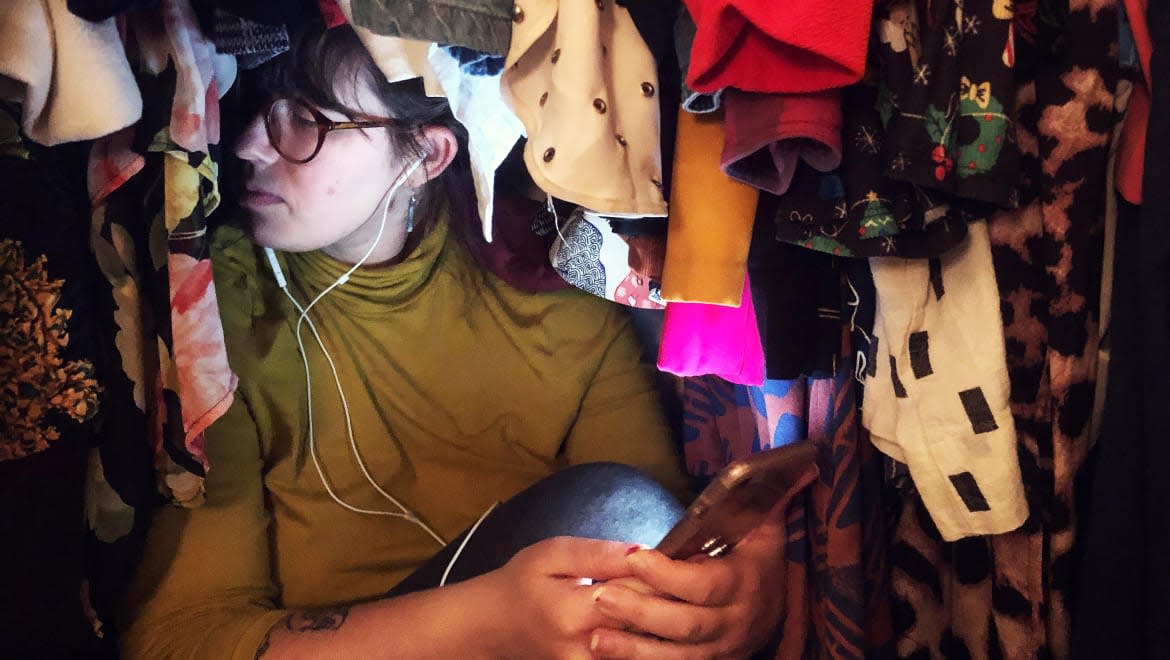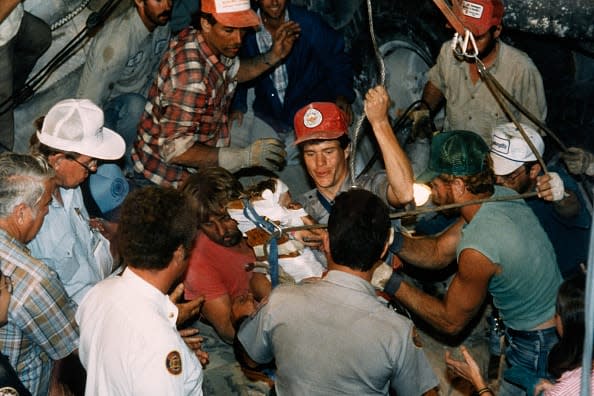Baby Jessica McClure’s Mine Drama Returns, Right into Your Home

Thirty-three years ago this week, a baby was left alone in the yard in Midland, Texas, for just a moment as her mother ran inside to answer a ringing phone. In the minutes she was gone, the baby crawled into an 8-inch well that was partially covered by grass and leaves, and tumbled, 22 feet below the earth.
Her rescue, coming over the next three days, gripped a nation in a way that was hardly possible in the days before Twitter and the internet, and before cable news provided a constant stream of commentary on our lives. Here was a pure innocent, through no fault of her own, facing circumstances that were on the one hand unimaginable, but on the other entirely relatable: Who couldn’t picture themselves curled up underground, sitting in the quiet dark, unaware of the world above or the frantic efforts to reach you?
The 2020 Tony Awards Should Be About Saving Theater, as Well as Trophies
Now that news event has been distilled into a play—which aims to takes you to physically and psychologically akin space. And so it was, one recent Sunday night, I found myself wrapped in a blanket, with the lights off, sitting under my desk for several hours, listening though the phone to the story of Baby Jessica McClure and her dramatic rescue from a well amidst the oil fields of West Texas in October 1987.
This was live theater, or what amounts to live theater in these unsettled times. But Baby Jessica’s Well-Made Play, written by the playwright Philip Santos Schaffer and performed through his site-specific and individualized performance production company WalkUpArts, isn’t just about the excavation of a single body from the subterranean depths. It is about the excavation of the audience’s inner depths, their fears, their hopes and longings.

Rescuers worked for 58 hours to free "Baby Jessica" from the eight-inch-wide hole in which she fell.
The play unfolds at first like a radio drama pumped through cellphone headphones, one listener at a time. It begins with the story of Jessica’s fall into the well, the frantic screams of her mother as she discovers what happened, the phone call to the father’s work place, rescuers rushing to the scene.
But it soon spins off in unanticipated directions. A voice comes on the phone, in my performance played by veteran actor Mary Round, who serves as my interlocutor. She asks me to pause with her for 58 seconds in silence, each second standing for an hour that Jessica was underground. She tells me stories about herself, and asks me to tell her stories of my own.
“Tell a story about the darkest place you have ever been,” she asks. Or again, later. “Tell me a story about the feeling of getting in trouble as a child.” And, “Tell a story about loneliness.”
After intermission, a new voice comes on the line. This time the person on the other end is an audience member, but one who has heard the play already a previous night. In this act, there is no exposition, no trading of stories. The audience member who is now part of the show runs down a list of 58 questions—about the show, about me, about my hopes and fears for the future.
A few nights later, for the show’s final act, I do the same for someone else who had just heard the previous three acts. And in doing so, I am both an audience member, watching as the play unfolds, and in the play, reading from a script and delivering the experience anew to someone.
“I think everyone is lonely. Being alive is being lonely,” said Santos Schaffer in a phone interview. “I think of it like we are all driving our cars down the same highway, and you can roll open your window and talk to somebody or you can wave to people but you can’t get out of your car and into someone else’s because we are not all going to the same place.”
“Everyone has been deathly afraid of something, everyone has had something happen in their life that feels like a miracle”
Santos Schaffer, 29, grew up in Los Angeles. His mother was obsessed with the Baby Jessica story, and he read everything he could about it and kept a scrapbook of any stories that mentioned the whole saga. It wasn’t just that hers was a story of isolation, it was also that it was a story of a media saga, and of a heroic rescue, and one of the rare news stories that ends on a triumphant note. (Three-decade-later spoiler alert: Jessica was rescued and was mostly fine, has children of her own now and no memory of falling down the well.)
Santos Schaffer got into creating political theater in high school, work that mostly makes him cringe now, including one performance at the height of the Iraq War in which he waterboarded himself draped in an American flag and then mopped up the mess with newspaper. (“My parents really had to sit through a lot,” he now says.)
Tired of feeling like one of “the weird kids,” he moved to New York for school, and realized that theater, even didactic theater, didn’t have to drown itself in self-seriousness, that it could be fun and playful too. He started WalkUpArts with a friend, Audrey Frischman, because they were living in a fourth floor walk-up and it was the only space they could afford to put on productions.
The idea from the start was not only to use whatever space was available but to see those space limitations as integral to the work. In 2018, they performed The End of the World Bar and Bathtub, a play about finding a safe space in advance of the apocalypse, for a maximum of two people in a bathroom. Or, more specifically, in your bathroom. The performance came to audience members’ homes.
Santos Schaffer says theater is like yoga for empathy. It allows us to invest the care we usually have reserved just for ourselves for characters on stage. What, he asks, if we could then spread that empathetic circle outwards, to people we love and even to strangers. And so the play moves us through the stages of concern--about a baby down the well, then about ourselves, then outward to this voice on the other line.
It fosters intimate questions among strangers, asking us if we can make those same connections with others. Why, after all, did the country care so much about this one baby for those few days in 1987, when so many are allowed to suffer every day without that same kind of concern?
“Everyone has stories that they tell themselves that they never tell anyone else. Everyone has been deathly afraid of something, everyone has had something happen in their life that feels like a miracle,” Santos Schaffer said. “I think the play tries to explore the space between fear and hope. We are all waking up these days imagining what awful thing is going to happen next, and if we can imagine that then what else can we imagine? Can we imagine something better? Can you explain what that is? Can you tell someone else about it? These are the connections we are making.”
Get our top stories in your inbox every day. Sign up now!
Daily Beast Membership: Beast Inside goes deeper on the stories that matter to you. Learn more.

 Yahoo News
Yahoo News 
